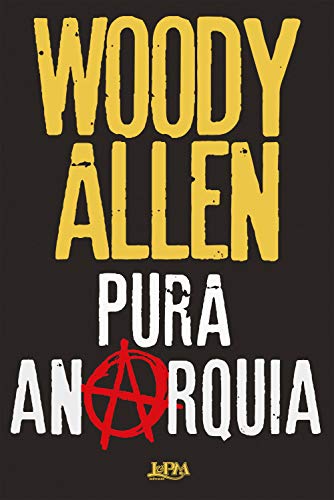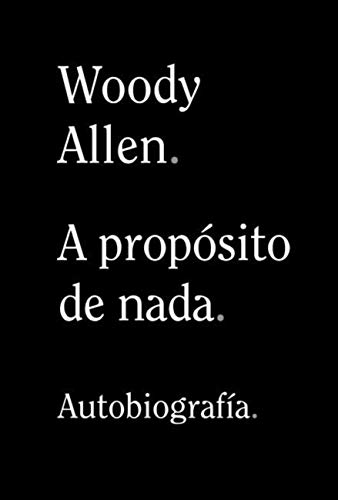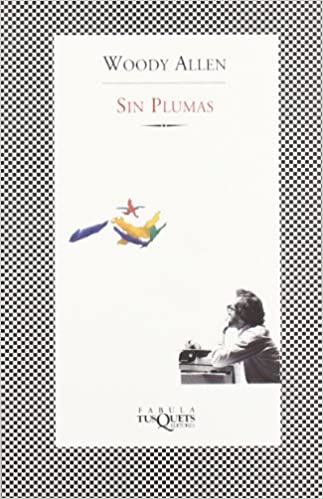What to say about Woody Allen filmmaker? Just revere ourselves before a type of fragile appearance and anodyne presence who ends up spreading his wit in a universe without parallel.
But we also have Woody Allen writer who occasionally indulges in new fictions on paper, tragicomedies of our days, thoughts, stories and even a recent autobiography.
The truth is that years ago I was not much of Woody Allen. But there was an interview and a movie that changed everything. And it is that on one occasion they asked him about the two most beautiful words in the world. He, with his tired look of a beaten dog, answered the journalist longing for something romantic: "The two most beautiful words are: it is benign!" And I thought how fucking true that is, especially when told by a doctor who has just analyzed something new and strange that lodges in your body.
Regarding the movie, it was "Match Point" that turned my notion about Allen's style and background. I do not know, it must be something magical that this genius slides between his realistic presentations, that touch of wonderful tragicomedy of the most mundane living, his ability to capture the vision of the world of his characters. He beat me and I began to see what his facet as a writer was like.
Top 3 recommended books by Woody Allen
About nothing
A great opportunity to get a glimpse of the self-made Woody Allen inside. Because in that improvised formula, in that sudden learning that was the life of the acclaimed director, resides his narrative background, that intensive knowledge of the recesses of the soul and its behavioral disguises.
In this heartfelt and often hilarious memoir, the celebrated director, comedian, writer, and actor offers a comprehensive and personal look at his fast-paced (or perhaps better run-down) life. Beginning with his childhood in Brooklyn and his stint as a writer for the iconic Sid Caesar's variety show in the early days of television. There he worked with great characters in American comedy, Allen tells his difficult but already noisy first days before achieving recognition and success.
With his usual narrative dynamism (paradoxically frantic in the face of his calm presence), he recounts his beginnings as a filmmaker already in his thirties, with comedies such as "Grab the money and run", and revisits his entire sixty-year and enormously productive career as a writer and director, from his classics Annie Hall, Manhattan, and Annie and Her Sisters to his most recent films, including "Midnight in Paris." Along the way, she talks about her marriages, romances, and high-profile friendships. But he also delves into his love of making jazz music, reviewing beloved books and plays that transformed him.
Woody Allen's sincerity is laughter and mockery, but also an undeniable descent into hell to meet his demons. Those who have mistakes as well as great successes but demons from which he also learned. This is a hugely entertaining, deeply honest, rich and brilliant self-portrait from a celebrated artist who is among the greatest filmmakers of our time.
No feathers
Being back from everything, being that eccentric taken more for wise than for crazy is what he has. Woody Allen recreates his role as a genius to attack precisely those patterns that exalt to the base or that plunge into misery. And better take it with humor, as with any other of the human vanities.
Emily Dickinson, the great American poet, tries to convince us that hope "is that thing with feathers." Not so, says Woody Allen. That feathered thing turns out to be his nephew. In short, what is certain is that here the ignorant learned Woody Allen once again lashes out against culture. Without feathers is the second compilation of his satirical writings. In addition to the stories published regularly in the The New Yorker, admirable texts from other sources have been rescued - some even unpublished - as well as two hilarious one-act comedies: God and Death.
In all of them Woody Allen makes bizarre reflections on the problems that obsess him and that have made him famous: death, God (or his lack), women (or his lack), intellectuals, the arts and even dentists. Not content with this, he guides the reader about the great interest of the themes that inspire the ballets, how to exercise civil disobedience, or how to examine a psychic phenomenon.
Pure anarchy
Only a brilliant comedian like Woody Allen could conceive a musical around the Fin de Siècle Vienna in which Alma Mahler would successively beat Gustav Mahler, Walter Gropius, Oskar Kokoschka, Franz Werfel, Gustav Klimt, Egon Schiele, Ludwig Wittgenstein and Karl Popper.
The via crucis that an unwary person goes through when he entrusts his house renovations to a suspiciously sensible contractor; a delirious epistolary exchange between the director of a summer camp and the father of one of the children (quite an idiot, it must be said) who spends the holidays there; the vicissitudes of a man who, in full New Age fashion, aspires to levitate, but who sets out to practice without mastering the technique...
These are some of the hilarious situations Allen describes in his new book. In addition to psychiatrists who end up worse than their patients, and unfortunate actors willing to do anything to be able to eat, bizarre societies parade through these stories, such as the company that auctions prayers on eBay for wishes to be fulfilled... without too many guarantees, and naive to those who want to sell suits that exhale odors, provide water or recharge your cell phone by simply rubbing it against one of your sleeves.
Woody Allen makes us laugh again with his stories: from the police to gourmets, through Mickey Mouse, private detectives or nurseries, nothing escapes the acid taunts of Woody Allen in these eighteen stories.




9 comments on "Don't miss Woody Allen's 3 best books"